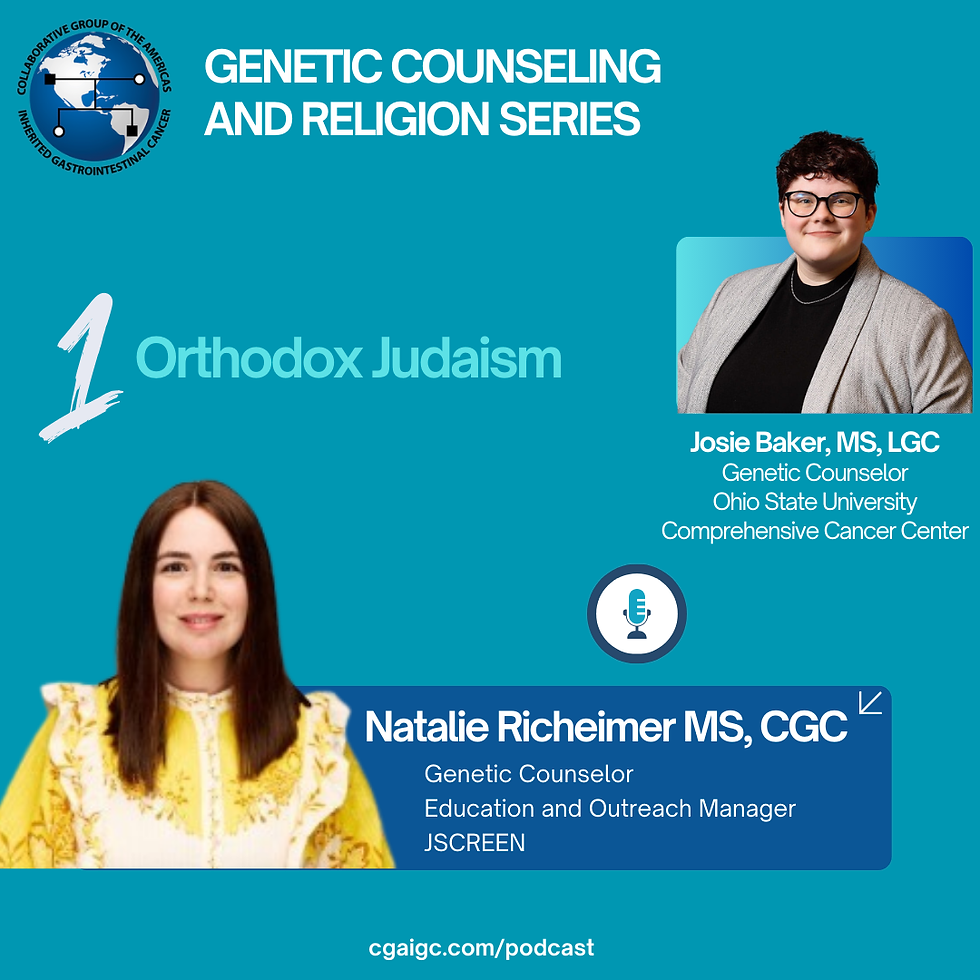Celebrating 30 Years of CGA-IGC and Progress in Hereditary GI Cancer!
- CGA-IGC
- Oct 4, 2025
- 3 min read

The story of CGA-IGC begins in 1995, when James Church suggested that clinicians and researchers in the US who were interested in hereditary colorectal cancer meet. Ira Kodner volunteered to host the meeting in St. Louis, and the attendees agreed to continue meeting annually.
Miguel Rodriguez-Bigas hosted the gathering in Buffalo in 1996, and the Collaborative Group of the Americas on Inherited Colorectal Cancer was officially born. The following year, James Church welcomed attendees to Cleveland for the first academic meeting.
CGA-IGC returned to St. Louis in 1998 for another meeting hosted by Dr. Kodner, and in 1999, David Rothenberger carried the torch to Minneapolis.
These formative years were crucial. They laid the scientific foundation on which CGA-IGC still stands, and they set the tone for what the community would become, multidisciplinary, collaborative, and deeply committed to advancing the field.
The 2000s saw the steady growth of our society. By 2000, the Group had formally adopted its Bylaws and Constitution, and the first Council was established under President Terri Berk. CGA-IGC’s early meetings were a labor of love for the Cleveland Clinic staff. Without an outside administrative company, they were in charge of registration coordination and meeting logistics. In those early days, the annual meetings were held in conjunction with larger surgical, human genetics, or genetic counseling conferences—an arrangement that encouraged cross-specialty engagement and fostered the powerful, multidisciplinary collaborations.
The hereditary GI cancer space continued to grow as well, in particular where Lynch syndrome was concerned. The 2000s brought about the development of mismatch repair immunohistochemistry for diagnostic testing, and universal tumor testing for Lynch Syndrome was piloted and subsequently endorsed in 2009. Polyposis was not to be ignored, however, as in 2002 MUTYH-associated polyposis was identified.
The 2010s brought rapid change and innovation and were a pivotal decade for our society. During this time, we strengthened our governance with a clear mission and vision, and engaged a professional management company so volunteers could focus on advancing the science that drives our field. Membership expanded, with more members actively contributing through the new structure, and by the end of the decade our community had grown to over 300 strong.
Our annual meetings also grew in size and impact, moving from city to city and connecting with the hereditary GI cancer community where they live and practice. One memorable year was 2012, when Superstorm Sandy disrupted travel and reduced attendance at the Boston meeting, yet the resilience of our members ensured the science continued to be shared.
The 2010s brought about a boom in the development of multi-gene hereditary cancer panels and the expansion of next-generation sequencing for hereditary GI cancers. The National Comprehensive Cancer Network continued to publish guidelines on who should consider genetic testing and precision medicine hit the scene as tumor mutational burden began to enter oncology decision making. In 2018, the recommendation was issued that all pancreatic cancer patients undergo germline genetic testing, as the results of that testing have implications for treatment and family members own cancer screening.
The 2020s began with a global pandemic that reshaped how we connect, work, and experience culture. They so far have been about adaptation and creativity, blending technology, culture, and everyday rituals in ways that continue to shape how we live and connect today.
The pandemic also impacted CGA-IGC, with the 2020 and 2021 Annual Meetings held virtually. Post-pandemic, CGA-IGC began holding stand-alone meetings and launched several new partnerships with professional organizations and patient advocacy groups, marking the beginning of a new era for the society. With the momentum of these successes, 2024 was the right time to revisit our plans for the future, and a new 3-year Strategic Plan was developed.
The hereditary GI cancer space embraced the digital world in the 2020s too. Many genetic counseling clinics found themselves relying heavily on tele-health, and as a result genetics services became even more accessible. Clinics began utilizing AI tools, such as chatbots, to identify patients who may benefit from genetic counseling and testing. As more healthy patients undergo genetic testing and are identified to be high-risk, advances continue to be made in hereditary cancer registries and surveillance programs.
The past thirty years have brought plenty of growth and change. CGA-IGC is excited to see what discoveries in hereditary GI cancer the next decades bring, and to be on the forefront of research, prevention, and patient care!




Comments